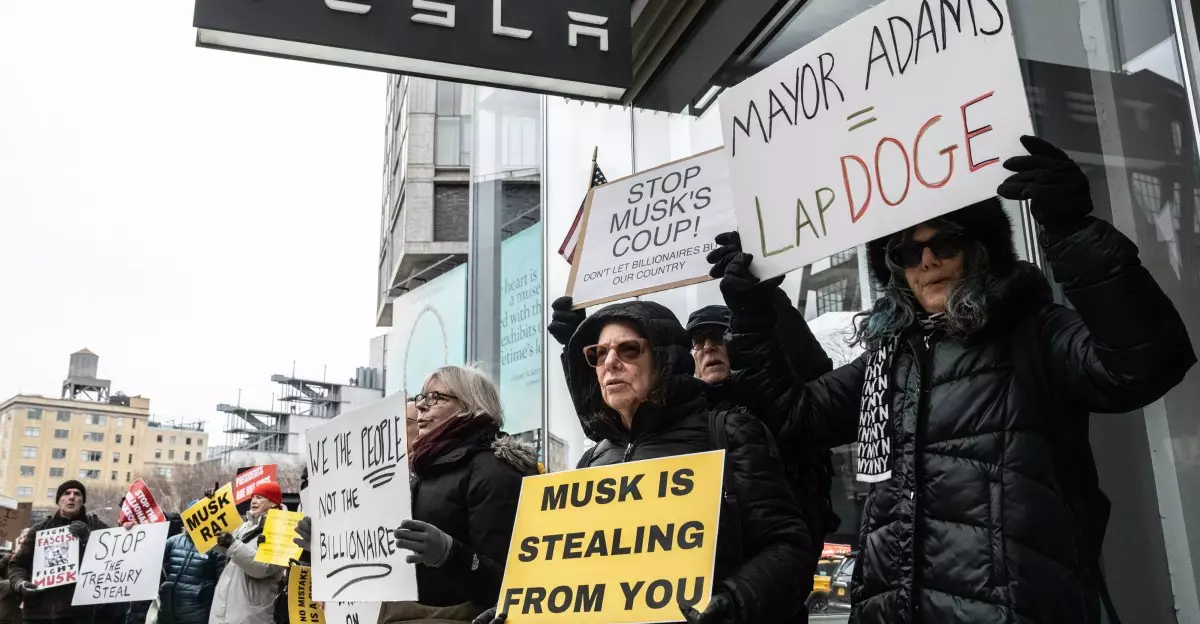In a striking demonstration of public dissent, protestors convened outside Tesla showrooms across various cities in the United States this past weekend. This series of protests represents a growing discontent with the actions and political affiliations of the company’s CEO, Elon Musk, who has increasingly become a focal point of controversy since taking on the role of head of the Department of Government Efficiency under former President Donald Trump. While these protests might lack the sheer numbers seen in other mass movements, they emerge from a widespread feeling of unease among consumers and investors alike regarding the implications of Musk’s political choices for Tesla’s future and reputation.
The hashtag #TeslaTakeover has gained traction on social media platforms, particularly Bluesky, illustrating the modern methods through which these movements gain momentum. From New York City to smaller cities like Golden Valley in Minnesota, an array of locations saw gatherings as a demonstration of outrage against Musk’s political affiliations, including allegations of support for far-right groups, which critics argue contradict the progressive image that many of Tesla’s customers might hold.
Concerns from Investors and Employees
As protests unfold, internal discussions within Tesla highlight a brewing dissatisfaction among employees and stakeholders. Reports indicate that some senior staff and employees have suggested that the company’s trajectory could improve should Musk step down. The fallout from his political associations has led to a notable decline in Tesla’s stock prices, plummeting by 21 percent since the beginning of Trump’s presidency, leading investors to express rising concerns about the firm’s future.
This sentiment is echoed by a diverse group of protestors whose chants encapsulated their sentiments about Musk’s leadership and Tesla’s brand. Statements such as “Don’t buy swasticars” and “Elon Musk can go to Mars; we don’t need your Nazi cars” expose the depth of feelings against the perceived harmful political affiliations of the CEO. In many ways, these protests seem to signal a demand for accountability from one of the most influential figures in technology today.
Prominent individuals like actor and director Alex Winter have stepped into the spotlight to voice their opposition, encouraging consumers to re-evaluate their connections to Tesla’s brand. In addition to his vocal support for the protests through social media, Winter’s presence at a demonstration in Pasadena showcases how celebrity activism can amplify grassroots movements, lending additional visibility and urgency to an already critical debate.
Further illustrating this ethos of resistance, musician Sheryl Crow made headlines by posting a video of her Tesla being taken away, making a pointed statement about the values we align ourselves with, particularly in a climate where corporate behavior is under heightened scrutiny. Crow’s statement encapsulates a growing sentiment among consumers willing to sever ties with brands that no longer resonate with their ethical considerations, a shift that could pose significant ramifications for Tesla if this sentiment continues to spread.
The protests are not expected to wane soon, with additional demonstrations planned across various cities, coinciding with national holidays like President’s Day. The collective grievances voiced by protestors represent not only dissatisfaction with Musk’s political endeavors but also a broader critique of the intertwining of corporate power and politics, an issue that has gained heightened visibility in recent years.
As social movements increasingly intertwine with digital platforms for organization and mobilization, protests like these underscore a vital moment of reflection for corporations like Tesla. The potential backlash fueled by activism symbolizes an impending demand for accountability and corporate responsibility towards social issues and political stances.
The protests happening outside Tesla showrooms signal a pivotal cultural moment wherein consumer values are clashing with corporate governance and leadership. As public figures continue to align themselves with the movement, the implications for Tesla could reshape not just its brand identity but the industry’s approach to corporate responsibility in politics, effectively marking a new chapter in the relationship between technology, politics, and the consumer.

